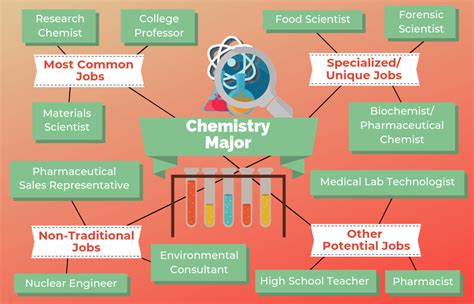Are you a STEM graduate with a passion for chemistry? Eager to kickstart your career in the chemical industry? This comprehensive guide will provide you with a roadmap to entry-level chemistry jobs, empowering you to navigate your job search effectively and land your dream role.

The Growing Demand for Entry-Level Chemists
The chemical industry is a crucial pillar of the global economy, contributing trillions of dollars annually and employing millions worldwide. As technological advancements and societal needs continue to evolve, the demand for skilled chemists remains strong. The Bureau of Labor Statistics projects a 4% growth in employment opportunities for chemists between 2021 and 2031, with an estimated 139,100 positions available by 2031.
Types of Entry-Level Chemistry Jobs
The chemical industry offers a diverse range of entry-level roles for chemistry graduates, including:
Laboratory Technicians:
Laboratory technicians conduct experiments, analyze data, and maintain laboratory equipment. They support research and development activities, quality control, and production processes.
Research Assistants:
Research assistants assist professors and scientists in conducting research projects. They gather data, perform experiments, and contribute to scientific publications.
Production Operators:
Production operators monitor and control chemical production processes, ensuring safety, efficiency, and adherence to quality standards.
Analytical Chemists:
Analytical chemists use analytical techniques to identify and quantify chemical substances in various materials. They work in fields such as forensics, environmental science, and pharmaceutical development.
Quality Control Analysts:
Quality control analysts ensure that products meet specified quality standards by performing tests and inspections. They monitor production processes and provide data for improvement.
Skills and Qualifications for Entry-Level Chemists
To qualify for entry-level chemistry jobs, you typically need:
- A bachelor’s degree in chemistry or a related field
- Strong analytical and problem-solving skills
- Proficient in laboratory techniques and instrumentation
- Excellent communication and interpersonal abilities
- Attention to detail and adherence to safety protocols
Finding Entry-Level Chemistry Jobs
Networking: Attend industry events, join professional organizations like the American Chemical Society (ACS), and connect with professionals on LinkedIn.
Online Job Boards: Explore job listings on websites like Indeed, Monster, and CareerBuilder.
University Career Services: Utilize university resources for resume writing, interview preparation, and job search guidance.
Company Websites: Visit the websites of chemical companies directly to check for open positions and submit applications.
Effective Strategies for the Job Search
- Tailor Your Resume and Cover Letter: Tailor your application materials to each specific job you apply for, highlighting relevant skills and experiences.
- Practice Your Interview Skills: Prepare for common interview questions and practice answering them confidently. Emphasize your enthusiasm for chemistry and your willingness to learn and grow.
- Gain Practical Experience: Consider internships or research projects to gain hands-on experience in a laboratory setting.
- Build a Strong Network: Establish relationships with professionals in the industry and keep them informed of your job search progress.
Tips and Tricks for Job Interviews
- Dress professionally: First impressions matter.
- Be prepared to discuss your research or project work: Showcase your skills and scientific knowledge.
- Ask insightful questions: Ask questions that demonstrate your interest in the company and the role.
- Stay informed about the industry: Keep up with current events and technological advancements in chemistry.
Table 1: Comparison of Entry-Level Chemistry Jobs
| Job Title | Responsibilities | Education | Average Salary |
|---|---|---|---|
| Laboratory Technician | Conducting experiments, analyzing data, maintaining equipment | Bachelor’s in chemistry | $45,000 – $65,000 |
| Research Assistant | Assisting professors and scientists in conducting research | Bachelor’s in chemistry | $35,000 – $50,000 |
| Production Operator | Monitoring and controlling chemical production processes | High school diploma or equivalent | $40,000 – $55,000 |
| Analytical Chemist | Identifying and quantifying chemical substances | Bachelor’s in chemistry | $50,000 – $70,000 |
| Quality Control Analyst | Ensuring product quality | Bachelor’s in chemistry | $45,000 – $60,000 |
Table 2: List of Chemical Companies with Entry-Level Programs
| Company | Program | Application Deadline |
|---|---|---|
| Dow | Dow FastStart | Rolling admissions |
| BASF | BASF Early Career Development Program | Varies by location |
| Procter & Gamble | P&G Supplier Diversity Program | Varies by location |
| Johnson & Johnson | J&J Operation Jumpstart | Varies by location |
| DuPont | DuPont Young Professional Program | Varies by location |
Future Trends and Emerging Applications
The chemical industry is constantly evolving, with new technologies and applications emerging all the time. Some promising trends include:
- Green Chemistry: Developing environmentally sustainable chemical processes and products.
- Nanotechnology: Utilizing nanomaterials to create advanced materials and devices.
- Computational Chemistry: Using computer simulations to design and predict chemical behavior.
- Biochemistry: Combining chemistry with biology to create new medical treatments and biotech products.
By staying abreast of these trends, you can position yourself for success in the ever-changing chemical industry.
Conclusion
Entering the field of chemistry offers a plethora of rewarding career opportunities. By following the strategies outlined in this guide, you can effectively navigate your job search and secure an entry-level chemistry job that aligns with your skills and interests. With dedication and a passion for chemistry, you can embark on a fulfilling and successful career in this dynamic and ever-evolving industry.
